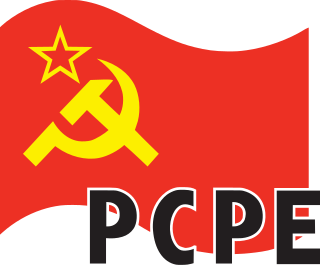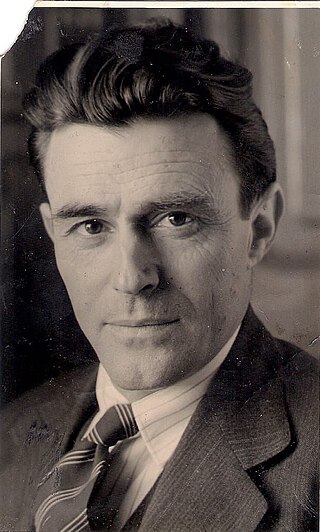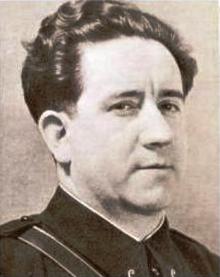Related Research Articles

The Communist Party of Spain is a communist party that, since 1986, has been part of the United Left coalition, which is currently part of Sumar. Two of its politicians are Spanish government ministers, the Minister of Labour and Social Economy and the Minister of Youth and Children.

Isidora Dolores Ibárruri Gómez, also known as Pasionaria, "the passionate one" or Passion flower", was a Spanish Republican politician of the Spanish Civil War of 1936–1939 and a communist known for her slogan ¡No Pasarán! issued during the Battle for Madrid in November 1936.

The Workers' Commissions since the 1970s has become the largest trade union in Spain. It has more than one million members, and is the most successful union in labor elections, competing with the Unión General de Trabajadores (UGT), which is historically affiliated with the Spanish Socialist Workers' Party (PSOE), and with the anarcho-syndicalist Confederación General del Trabajo (CGT), which is usually a distant third.

Andreu Nin i Pérez was a Spanish politician, trade unionist and translator. He is mainly known for his role in various Spanish left-wing movements of the early 20th century and, later, for his role in the Spanish Civil War. He is also known for his work translating Russian classics such as Ana Karenina, Crime and Punishment and some works by Anton Chekhov, from Russian into Catalan.

Santiago José Carrillo Solares was a Spanish politician who served as General Secretary of the Communist Party of Spain (PCE) from 1960 to 1982.

The Spanish Communist Workers' Party is an anti-revisionist Marxist-Leninist communist party in Spain. It was founded in 1973, when Enrique Líster revolted against the Eurocommunist line of Communist Party of Spain (PCE) general secretary Santiago Carrillo. The party published Análisis.

The Communist Party of Spain (Marxist-Leninist) is a communist political party in Spain, formed in 1964 through the merger of splinter groups of the Communist Party of Spain (PCE).

Communist Party of the Peoples of Spain is a Marxist–Leninist communist party in Spain. PCPE was founded out of the unification of several Marxist-Leninist factions. The youth organization is called the Communist Youth of the Peoples of Spain.

The Spanish transition to democracy, known in Spain as la Transición or la Transición española, is a period of modern Spanish history encompassing the regime change that moved from the Francoist dictatorship to the consolidation of a parliamentary system, in the form of constitutional monarchy under Juan Carlos I.

Jorge Semprún Maura was a Spanish writer and politician who lived in France most of his life and wrote primarily in French. From 1953 to 1962, during the dictatorship of Francisco Franco, Semprún lived clandestinely in Spain working as an organizer for the exiled Communist Party of Spain, but was expelled from the party in 1964. After the death of Franco and the change to a democratic government, he served as Minister of Culture in Spain's socialist government from 1988 to 1991.

Enrique Líster Forján was a Spanish communist politician and military officer.
Julián Grimau García was a Spanish politician, member of the Communist Party of Spain, executed during Francisco Franco's Francoist State.

José Díaz Ramos was a Spanish trade unionist and communist politician. He was the General Secretary of the Communist Party of Spain during the Spanish Civil War.

Fernando Claudín Pontes was a Spanish communist ideologist and historian best known for his two volume study The Communist Movement: From Comintern to Cominform.

José Bullejos y Sánchez was a Spanish communist politician. He served as the second General Secretary of the Communist Party of Spain from 1925 to 1932.

Victorio Codovilla, born Vittorio Codovilla, was an Italian-born Argentine socialist and later communist politician. At first a member of the Italian Socialist Party, he emigrated to Argentina in 1912 and went on to hold prominent posts in the Comintern and the Communist Party of Argentina (PCA), of which he was General Secretary in 1941–1963 and President in 1963–1970.

Eurocommunism was a trend in the 1970s and 1980s within various Western European communist parties, which said they had developed a theory and practice of social transformation more relevant for Western Europe. During the Cold War, they sought to reject the influence of the Soviet Union and the Communist Party of the Soviet Union. The trend was especially prominent in Italy, Spain, and France.

Pedro Fernández Checa, usually known as Pedro Checa was a Spanish Communist who played a leading role in the party during the Spanish Civil War (1936–39). After the defeat of the Republic he was forced into exile in the Soviet Union and then Mexico, where he died.

Antonio Mije García was a member of the Spanish Communist Party who became a deputy for Seville in the Second Spanish Republic. He served in various senior positions during the Spanish Civil War (1936–39). After the war he lived in France, Mexico and Czechoslovakia. He managed to retain his position as a party executive during the internecine struggles of the long years of exile.

Manuel Azcárate Diz was a Spanish journalist, politician and a leader of the Communist Party of Spain in the 1960s and 1970s.
References
- Death Notice published in the New York Times, 24 November 1990